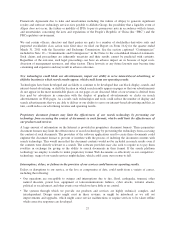Yahoo 2011 Annual Report Download - page 28
Download and view the complete annual report
Please find page 28 of the 2011 Yahoo annual report below. You can navigate through the pages in the report by either clicking on the pages listed below, or by using the keyword search tool below to find specific information within the annual report.Our international operations are subject to additional risks which could harm our business, operating results,
and financial condition.
In addition to uncertainty about our ability to continue to generate revenue from our foreign operations and
expand our international market position, there are additional risks inherent in doing business internationally
(including through our international joint ventures), including:
• trade barriers and changes in trade regulations;
• difficulties in developing, staffing, and simultaneously managing a large number of varying foreign operations
as a result of distance, language, and cultural differences;
• stringent local labor laws and regulations;
• longer payment cycles;
• credit risk and higher levels of payment fraud;
• profit repatriation restrictions and foreign currency exchange restrictions;
• political or social unrest, economic instability, repression, or human rights issues;
• geopolitical events, including acts of war and terrorism;
• import or export regulations;
• compliance with U.S. laws such as the Foreign Corrupt Practices Act, and local laws prohibiting bribery and
corrupt payments to government officials;
• antitrust and competition regulations;
• seasonal volatility in business activity and local economic conditions;
• laws, regulations, licensing requirements, and business practices that favor local competitors or prohibit
foreign ownership or investments;
• different or more stringent user protection, content, data protection, privacy and other laws; and
• risks related to other government regulation or required compliance with local laws.
We are subject to numerous and sometimes conflicting U.S. and foreign laws and regulations. Violations of these
complex laws and regulations that apply to our international operations could result in damage awards, fines,
criminal actions, sanctions, or penalties against us, our officers or our employees, prohibitions on the conduct of
our business, and damage to our reputation. Although we have implemented policies and procedures designed to
promote compliance with these laws, there can be no assurance that our employees, contractors, or agents will
not violate our policies. These risks inherent in our international operations and expansion increase our costs of
doing business internationally and could result in harm to our business, operating results, and financial condition.
The benefits of the Framework Agreement may not be realized and we are involved in legal proceedings
related to Alipay that may result in adverse outcomes.
On July 29, 2011, we entered into a Framework Agreement with Alibaba Group Limited (“Alibaba Group”),
Softbank Corp., a Japanese corporation, Alipay.com Co., Ltd. (“Alipay”), APN Ltd., a company organized under
the laws of the Cayman Islands (“IPCo”), Zhejiang Alibaba E-Commerce Co., Ltd., a limited liability company
organized under the laws of the People’s Republic of China (“Holdco”), Jack Ma Yun, Joseph C. Tsai and certain
security holders of Alipay or HoldCo as joinder parties. See Note 4—“Investments in Equity Interests” in the
Notes to the consolidated financial statements. Pursuant to the terms of the Framework Agreement, the parties
agreed upon the consideration to be received by Alibaba Group for the restructuring of Alipay and the ongoing
relationship between Alipay and Alibaba Group and its subsidiaries. The closing contemplated by the Framework
Agreement occurred in December 2011. Alibaba Group may not realize the anticipated benefits of the
26
























